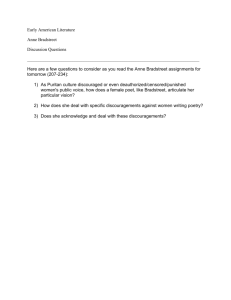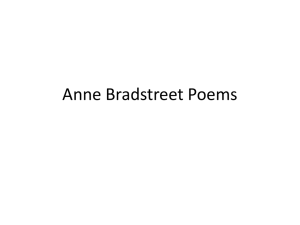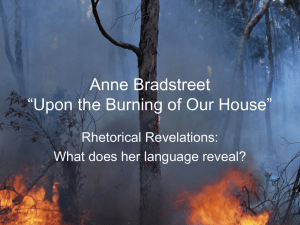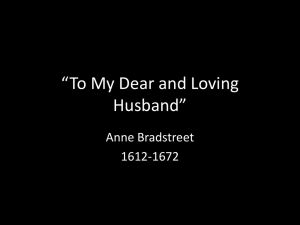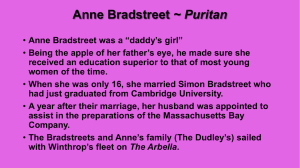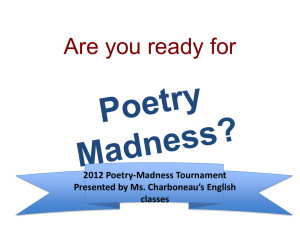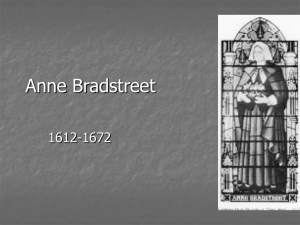"The Author to Her Book" Complete by Thursday, 10/1
advertisement
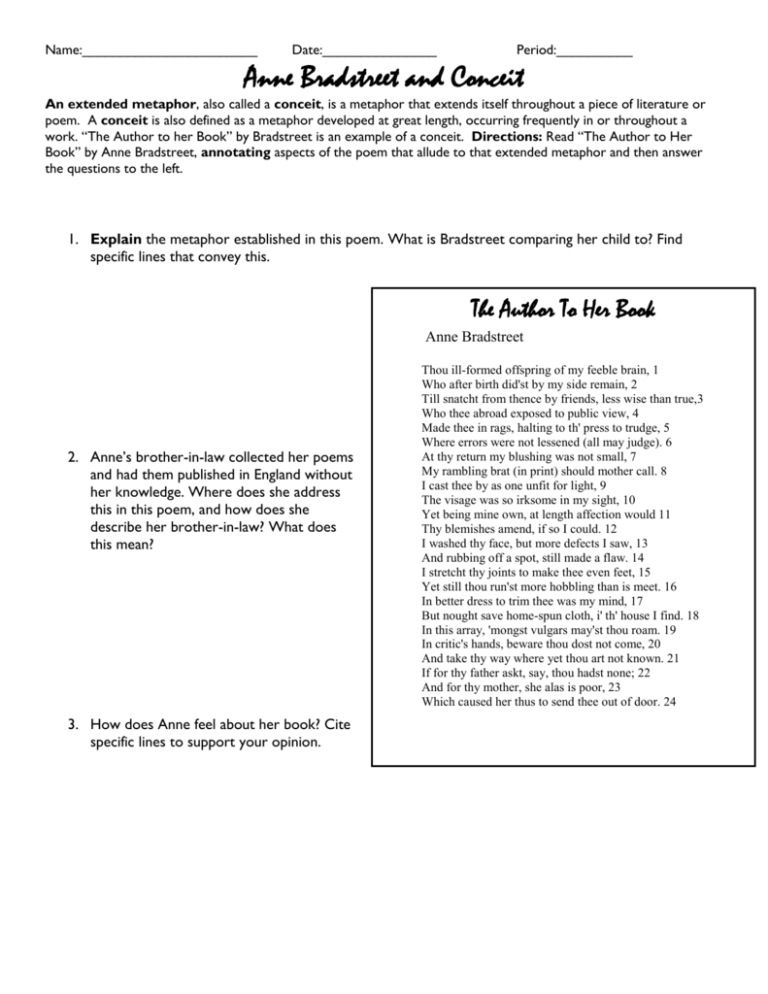
Name:_______________________ Date:_______________ Period:__________ Anne Bradstreet and Conceit An extended metaphor, also called a conceit, is a metaphor that extends itself throughout a piece of literature or poem. A conceit is also defined as a metaphor developed at great length, occurring frequently in or throughout a work. “The Author to her Book” by Bradstreet is an example of a conceit. Directions: Read “The Author to Her Book” by Anne Bradstreet, annotating aspects of the poem that allude to that extended metaphor and then answer the questions to the left. 1. Explain the metaphor established in this poem. What is Bradstreet comparing her child to? Find specific lines that convey this. The Author To Her Book Anne Bradstreet 2. Anne’s brother-in-law collected her poems and had them published in England without her knowledge. Where does she address this in this poem, and how does she describe her brother-in-law? What does this mean? 3. How does Anne feel about her book? Cite specific lines to support your opinion. Thou ill-formed offspring of my feeble brain, 1 Who after birth did'st by my side remain, 2 Till snatcht from thence by friends, less wise than true,3 Who thee abroad exposed to public view, 4 Made thee in rags, halting to th' press to trudge, 5 Where errors were not lessened (all may judge). 6 At thy return my blushing was not small, 7 My rambling brat (in print) should mother call. 8 I cast thee by as one unfit for light, 9 The visage was so irksome in my sight, 10 Yet being mine own, at length affection would 11 Thy blemishes amend, if so I could. 12 I washed thy face, but more defects I saw, 13 And rubbing off a spot, still made a flaw. 14 I stretcht thy joints to make thee even feet, 15 Yet still thou run'st more hobbling than is meet. 16 In better dress to trim thee was my mind, 17 But nought save home-spun cloth, i' th' house I find. 18 In this array, 'mongst vulgars may'st thou roam. 19 In critic's hands, beware thou dost not come, 20 And take thy way where yet thou art not known. 21 If for thy father askt, say, thou hadst none; 22 And for thy mother, she alas is poor, 23 Which caused her thus to send thee out of door. 24 Name:_______________________ Date:_______________ The Author To Her Book Period:__________ Anne Bradstreet and Conceit An extended metaphor, also called a conceit, is a metaphor that extends itself throughout a piece of literature or poem. A conceit is also defined as a metaphor developed at great length, occurring frequently in or throughout a work. “The Author to her Book” by Bradstreet is an example of a conceit. Directions: Read “The Author to Her Book” by Anne Bradstreet, annotating aspects of the poem that allude to that extended metaphor and then answer the questions to the left. Name:_______________________ Date:_______________ Period:__________ The Author To Her Book Anne Bradstreet Anne Bradstreet and Conceit An extended metaphor, also called a conceit, is a metaphor that extends itself throughout a piece of literature or Thou ill-formed offspring of my feeble brain, 1 poem. A conceit is also defined as a metaphor developed at great length, occurring frequently in or throughout a Who after birth did'st by my side remain, 2 work. “The Author to her Book” by Bradstreet is an example ofTill a conceit. Directions: Read “The Author Her snatcht from thence by friends, less wise thanto true, 3 Book” by Anne Bradstreet, annotating aspects of the poem that allude to that extended metaphor and then answer Who thee abroad exposed to public view, 4 the questions to the left. Made thee in rags, halting to th' press to trudge, 5 Name:__________________________ Where errors were not lessened (all may judge). 6 At thy return my blushing was not small, 7 My rambling brat (in print) should mother call. 8 I cast thee by as one unfit for light, 9 The visage was so irksome in my sight, 10 Yet being mine own, at length affection would 11 Thy blemishes amend, if so I could. 12 I washed thy face, but more defects I saw, 13 And rubbing off a spot, still made a flaw. 14 I stretcht thy joints to make thee even feet, 15 Yet still thou run'st more hobbling than is meet. 16 In better dress to trim thee was my mind, 17 But nought save home-spun cloth, i' th' house I find. 18 In this array, 'mongst vulgars may'st thou roam. 19 In critic's hands, beware thou dost not come, 20 And take thy way where yet thou art not known. 21 If for thy father askt, say, thou hadst none; 22 And for thy mother, she alas is poor, 23 Which caused her thus to send thee out of door. 24 Directions: Take out your Puritan Literature Scavenger Hunt notes to use what you already know about Bradstreet to help you understand the poem and her underlying meaning. Bradstreet’s entire poem may be seen as an extended metaphor, meaning she is comparing her collection of work to something specific for effect. As we read the poem, highlight or underline the passages which help you to understand this comparison. 1. From what you have learned about Bradstreet who was the friend, “less wise than true” who snatched her book? What have you learned about Anne Bradstreet, which may explain why she becomes so upset about her book being published? 2. Explain the metaphor in this poem. What is she comparing her book to? Cite 3 specific examples that you highlighted or underlined as we read the poem aloud. Underneath each citation, explain the meaning of the metaphor being established. Name:_______________________ Date:_______________ Period:__________ Anne Bradstreet and Conceit An extended metaphor, also called a conceit, is a metaphor that extends itself throughout a piece of literature or poem. A conceit is also defined as a metaphor developed at great length, occurring frequently in or throughout a work. “The Author to her Book” by Bradstreet is an example of a conceit. Directions: Read “The Author to Her Book” by Anne Bradstreet, annotating aspects of the poem that allude to that extended metaphor and then answer the questions to the left. 3. How does Anne feel about her book? Cite at least 3 specific lines from the poem to support your opinion.
